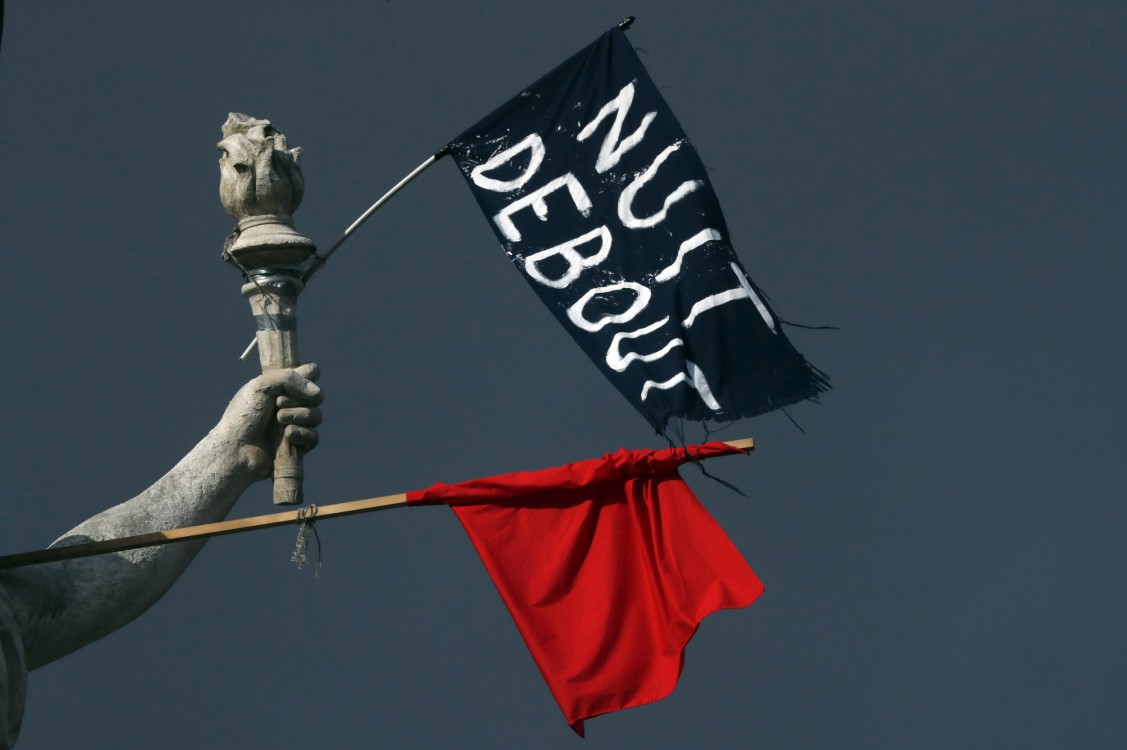
Since its founding on March 31, Nuit Debout, a horizontal democracy-driven resistance movement active in 266 French cities has given participants opportunities to discuss and act on critical issues affecting people from widely different economic backgrounds.
The movement, which also exists in 130 cities outside of France, functions on several levels. It reflects a living version of the Camusian "zero point" metaphor because participants, both individually and collectively, have a chance to think about, question and express ideas about their own existence at assembly sessions – as well as address structural and thematic subjects including democracy, alternative economy and currency, technology and the environment.
Nuit Debout has been celebrated as an attempt to reclaim and re-establish democracy for French citizens who prefer a counter-hegemonic approach to quotidian concerns and issues. The kind of democracy favored by Nuit-Deboutistes is self-autonomous and horizontal, as opposed to a more traditional, top-down democratic or pyramid structure of past movements.
"The current security state is ominous and chilling, but will the country go full-on fascist? I honestly do not know," said Luc Sante, responding to the current socio-political climate in France.
A Meeting Place
Nuit-Deboutistes originally met at Place de la République in Paris, which is connected to a Metro train station. The square has become more recently known around the world as a place where people solemnly gather after tragedies that have occurred in France.
"As far as Place de la République is concerned, it's an interesting choice. Haussmann expressly built it as a monumental obstruction to gatherings of le peuple – in its orientation and the sort of buildings that line it. The more traditional settings for demonstrations are Bastille and Nation," said Sante.
During the Spring, Nuit-Deboutistes specifically protested against the decision of President Francois Hollande's administration to invoke the 49-3 clause, a draconian, authoritarian measure that facilitated the passage of the controversial anti-worker labor law, known as la loi travail, or loi El Khomri, with no debate or public input.
The relatively new paradigm Nuit Debout has built for French society, in terms of resistance movements and modes of social interaction, reflects a trend toward what scholars like Douglas Kellner and Joan Subirats have referred to as techno-politics.
"Many activist groups are coming to see that media politics is a key element of political organization and struggle and are developing forms of technopolitics in which they use the Internet and new technologies as arms of political struggle," wrote Kellner in an essay entitled "Techno-Politics, New Technologies and the New Public Spheres."
Birthing New Movements
While Nuit Debout continues to create itself as a viable social movement – its participants still gather on weekends – it is also in some respects transitioning into citizen initiatives, free-standing projects and more politically inclined groups. A number of groups that have risen to the surface in France, including Processus Vogué, Les Jours Heureux, Veille Artistique et Citoyenne, and 1000 Alternatiba, to name a few.
"Basically, from Nuit Debout, other things have been birthed. Other movements like AG Citoyenne, La Belle Démocratie, all working on local empowerment and the will to hack into the presidential elections. Candidates of all persuasions are now changing their program to sell us 'more democratic reforms,' Pierre Lalu, a Paris-based Nuit-Deboutiste, told Occupy.com. "It seems that the pressure of Nuit Debout has worked somehow."
As Manuel Cervera-Marzal, a political science professor affiliated with Sciences Po, and a Nuit Debout participant, asserted: "Nuit Debout is apartisan but not apolitical, which implies that it refuses the professionalized, representative and personalized practices of politics. It promotes a new form of political organization, based on voluntarism, direct democracy, and collectiveness," he added.
"But the dilemma is that Nuit Debout cannot last eternally. This is a striking point: from the beginning of 2000, there has been the antiglobalization movement, fighting against neoliberalism, that is to say the excess of capitalism. It was slightly different with Nuit Debout, because this movement was fighting against capitalism itself. There is a political radicalization in France: protesters become more and more angry, and the State is more and more repressive, authoritarian and securitarian."
At its height last spring, Nuit Debout Paris République attracted thousands of people. Geoffrey Pleyers, a sociologist at Université de Louvain in Belgium who specializes in social movements and participates in the Subterranean Politics project, may have the freshest and most accurate perspective on Nuit Debout – something attributable to his attending, as he said, "until mid June, 80 evenings in a row" at Place de la République.
"A Movement is Never Really Over."
Regarding the perceived ephemeral aspect of social movements, Pleyers sees them as existing beyond original occupations or gatherings, and cites citizen initiatives as one way that movements like Occupy Wall Street, among others, have managed to continue.
"The event is just a part of a movement. A movement is never really over," he said. According to Pleyers, although Nuit Debout originally focused on labor issues, it equally emphasized topics relating to refugees and asylum seekers. "We have to welcome refugees who are escaping their countries. The so-called left is quite harsh on the issue of refugees," Pleyers says.
Héctor Huerga, an organizer who was involved in Spain's 15-M movement of 2011, and who collaborated with Nuit Debout Paris République participants, spent three weeks in the French capital during the movement's nascency. He said social movements can be examined in terms of a 3-axis approach theorized by Professor Joan Subirats of Autónoma University in Barcelona.
As Huerga asserts, the 3-axis framework includes: "the axis of resistance or those groups that seek to visualize a problem with concrete actions; the axis of alternatives or those groups that have built prototypes of life and struggle walking parallel to the capitalist financial system; and the axis of incidence or those groups that are seeking to impact power structures through institutional alternatives or legal initiatives."
Huerga, who worked with the Global Debout commission of Nuit Debout to help create an international day of mobilization on May 15, traces the Barcelona version of horizontal democracy and autogestión, or self-management, back even further to the 19th century. "In the case of Barcelona, it is very clear that both concepts have been realized since the 19th century among anarchist communities. In the occupation of the Plaza de Catalunya in 2011, both general and thematic assemblies were hindered by external interests, not the lack of autogestión or horizontality," Huerga explained.
"It's not easy to break with a neoliberal stream as wild as we are experiencing nowadays, but what protests and the new forms of organization in France have achieved is to release that portion of fear provided by neoliberalism to each one of us, usually manifested when personal goals are not reached."
The Growth of Horizontal Democratic Organizing
Marina Sitrin, a lawyer, writer, former participant at Occupy Wall Street, and an expert on horizontal democracy, considered Nuit Debout to be part of a continuum of movements predicated on horizontalism.
"I see Nuit Debout as a part of the same genealogy of movements that include the popular rebellion in Argentina in 2001, the 15-M in Spain, Occupy and many similar assembly-based movements, including the Greek Square (Syntagma) and Assembly movements which began in 2008 and really took off in 2011," said Sitrin.
Sitrin continued, "The genealogy is movements post-1989 that do not look to the state but instead one another, using forms of self organization, direct and participatory democracy and direct action and prefigurative forms of relating."
The term horizontalism derived from the Argentinian term horizontalidad, which developed during the Dec. 19-20, 2001, grassroots economic rebellion in that country. Sitrin views autonomous Greek health clinics and recuperated workplaces across Europe reflective of the way horizontal movements can transform into citizen initiatives.
"People outside the newer, more horizontal movements tend to get stuck in prior ways of understanding movements and forms of relating in movements, rather than studying what is new," she said. They "therefore base conclusions on more traditional understandings, such as organizing with a hierarchical structure, with a list of demands on institutions of power and looking to either change the government through a party or overthrowing the government with another form of political party or organization. The newer movements are not organized around any of these things, and in fact are a conscious break from them."
French sociologist Anne Muxel, speaking to La Dépêche in April, said Nuit Debout rejects hierarchy and maintained it is "against the logic of vertical organization with leadership. They are for a horizontal collective management: these are alternative forms to traditional social movements, trade unions, parties."
She added that Nuit Debout is not a new phenomenon, either in France or Europe per se, but part of something greater. "In recent years, we are witnessing the birth of a movement, manifested in groups like the Indignados and the Zadistes (connected to Zone À Défendre), which are more focused on environmental issues," she said.
3 WAYS TO SHOW YOUR SUPPORT
- Log in to post comments

















Comments
DH Fabian replied on
Good Luck
Plenty of heady rhetoric, but who knows? We don't know what, if any, influence it would have in the US. Here, we watched as Occupy itself was so effectively redefined -- by Dem pols, liberal media, and a good many participants themselves -- as a mere pep rally for the better off, middle class workers. Liberals continue to implicitly preach the message that our deregulated capitalism is so successful, everyone is able to work and there are jobs for all, therefore no need for poverty relief. It's a clear message to stay the course. Good luck to France, good luck to Europe, but I see no reason to worry that Americans might fall under the spell of true democracy.